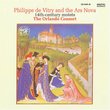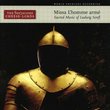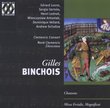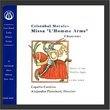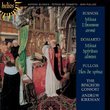| All Artists: French Anonymous, Jacob Obrecht, Johannes Ockeghem, Winfried Schrammek, Albrecht Lepetit, Eckhard Wagner, Thomas Neumann Title: Ockeghem: Missa L'Homme Armé/Cantus L'Homme Armé/Obrecht: Missa L'Homme Armé Members Wishing: 0 Total Copies: 0 Label: Querstand Records Release Date: 10/26/2006 Album Type: Import Genres: Special Interest, Classical Styles: Opera & Classical Vocal, Chamber Music, Historical Periods, Classical (c.1770-1830) Number of Discs: 1 SwapaCD Credits: 1 |
Search - French Anonymous, Jacob Obrecht, Johannes Ockeghem :: Ockeghem: Missa L'Homme Armé/Cantus L'Homme Armé/Obrecht: Missa L'Homme Armé
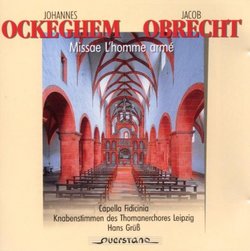 | French Anonymous, Jacob Obrecht, Johannes Ockeghem Ockeghem: Missa L'Homme Armé/Cantus L'Homme Armé/Obrecht: Missa L'Homme Armé Genres: Special Interest, Classical
|
Larger Image |
CD DetailsSimilar CDs |
CD ReviewsA memorable excursion into Franco-Flemish Renaissance music Eddie Konczal | 05/03/2007 (5 out of 5 stars) "Johannes Ockeghem and Jacob Obrecht are often classed together, and for understandable reasons: they were composers with similar names who belonged to the 15th century Franco-Flemish school of polyphony. They weren't exact contemporaries, however: Ockeghem lived from about 1410 to 1497 and bridged the stylistic gap from the earliest Renaissance composers (e.g. Binchois and Dufay) to the generation of Josquin and his contemporaries, to which Obrecht (1457-1505) belongs. Obrecht was among the first to use pervasive imitation in an overt manner; some claim that had he lived longer, he would have received more credit for pioneering this technique.
That both Ockeghem and Obrecht composed Mass cycles based on the anonymous "L'homme arme" melody is not terribly significant; nearly every major composer of sacred polyphony in the 15th century wrote a "Missa L'homme arme." In fact, this practice continued well into the 16th century, with High Renaissance composers such as Morales and Palestrina joining in the fun. The CD begins with the brief "L'homme arme" melody, followed by Ockeghem's Mass. The Mass movements exhibit an ethereal, serene beauty, with vocal lines that unfold gracefully. The beginning of the "Sanctus" movement demonstrates Ockeghem's willingness to plumb new depths in the bass voice. Obrecht's Mass follows, with a palpable change in style. Imitative motifs are more readily apparent, and melodic motion is more rhythmically driven, than in Ockeghem's polyphony. After the ethereal sound of Ockeghem, Obrecht's Mass exhibits an earthier quality, possibly due to a more workmanlike approach to composition. The consort Capella Fidiciana comprises male and female singers as well as brass and organ, providing a textural depth sometimes lacking in performances of Renaissance polyphony. The organ and brass interludes contrast nicely with the polyphonic sections. Fastidious observance of Renaissance performance practice and meticulous liner notes indicate Capella Fidiciana's desire to perform these works as authentically as possible. Capella Fidiciana's discography to date has mostly focused on German Baroque music. Their excursion into Franco-Flemish music of the Renaissance is a memorable one. " |

 Track Listings (12) - Disc #1
Track Listings (12) - Disc #1